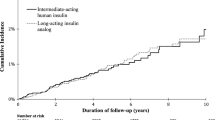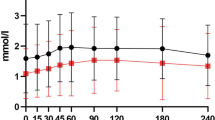Abstract
Background/Aims
Exogenous insulin therapy increases systemic exposure to insulin which may promote the development of colorectal neoplasia. We sought to evaluate the association between exogenous insulin therapy and the incidence of advanced adenoma in type 2 diabetes mellitus.
Methods
A retrospective cohort study was conducted from January 1, 2007, to January 1, 2018, in a regional health system serving the United States Philadelphia metropolitan area, Central New Jersey, and South Central Pennsylvania. Study patients consisted of a random sample of patients with type 2 diabetes mellitus aged 40–80 years who had undergone two rounds of colonoscopy examinations.
The exposure was cumulative duration of insulin therapy (i.e., no use, 1–365 days and > 365 days). The outcome was time to incident advanced adenoma.
Results
Of the 975 eligible patients, 184 patients accumulated > 365 days of insulin therapy before the follow-up colonoscopy. The mean (standard deviation) duration between the two rounds of colonoscopy examination was 5.1 (2.9) years among the insulin users and 5.3 (3.9) years among non-users. Compared to no insulin exposure, receiving > 365 days of insulin therapy was associated with an increased incidence of advanced adenoma (adjusted hazard ratio [aHR] 4.84, 95% confidence interval [CI] 2.82–8.30), right-sided advanced adenoma (aHR 5.48, 95% CI 2.90–10.35), and 3 or more adenomas (aHR 2.61, 95% CI 1.46–4.69) at the follow-up colonoscopy examination.
Conclusion
Insulin therapy is associated with an increased risk of advanced adenoma and may serve as a novel risk-stratification factor to enhance the efficiency of existing colorectal cancer screening and surveillance programs.
Graphical Abstract


Similar content being viewed by others
References
Siegel RL, Miller KD, Jemal A. Cancer statistics, 2019. CA Cancer J Clin 2019;69:7–34.
Howlader NNA, Krapcho M, Miller D, Brest A, Yu M, Ruhl J, Tatalovich Z, Mariotto A, Lewis DR, Chen HS, Feuer EJ, Cronin KA. SEER cancer statistics review, 1975–2016, national cancer institute. Bethseda: National Institutes of Health; 2019.
Sugarbaker JGL, Wittes R. Cancer: principles and practices of oncology. Philadelphia: De Vita VT: JB Lippincott; 1985.
Zauber AG, Winawer SJ, O’Brien MJ et al. Colonoscopic polypectomy and long-term prevention of colorectal-cancer deaths. N Engl J Med 2012;366:687–696.
Prevention CfDCa. National diabetes statistics report website. (2022)
UK Prospective Diabetes Study (UKPDS) Group. Intensive blood-glucose control with sulphonylureas or insulin compared with conventional treatment and risk of complications in patients with type 2 diabetes (UKPDS 33). Lancet 1998;352:837–853.
Garvey WT, Olefsky JM, Griffin J et al. The effect of insulin treatment on insulin secretion and insulin action in type II diabetes mellitus. Diabetes 1985;34:222–234.
Genuth S. Insulin use in NIDDM. Diabetes Care 1990;13:1240–1264.
Kaaks R, Toniolo P, Akhmedkhanov A et al. Serum C-peptide, insulin-like growth factor (IGF)-I, IGF-binding proteins, and colorectal cancer risk in women. J Natl Cancer Inst 2000;92:1592–1600.
Sandhu MS, Dunger DB, Giovannucci EL. Insulin, insulin-like growth factor-I (IGF-I), IGF binding proteins, their biologic interactions, and colorectal cancer. J Natl Cancer Inst 2002;94:972–980.
Yang YX, Hennessy S, Lewis JD. Insulin therapy and colorectal cancer risk among type 2 diabetes mellitus patients. Gastroenterology 2004;127:1044–1050.
Wong P, Weiner MG, Hwang W-T et al. Insulin therapy and colorectal adenomas in patients with diabetes mellitus. Cancer Epidemiol Biomark Prev 2012;21:1833.
Chung YW, Han DS, Park KH et al. Insulin therapy and colorectal adenoma risk among patients with type 2 diabetes mellitus: a case-control study in Korea. Dis Colon Rectum 2008;51:593–597.
Winawer SJ, Zauber AG. The advanced adenoma as the primary target of screening. Gastrointest Endosc Clin N Am 2002;12(1–9):v.
Gupta S, Lieberman D, Anderson JC et al. Recommendations for follow-up after colonoscopy and polypectomy: a consensus update by the us multi-society task force on colorectal cancer. Am J Gastroenterol 2020;115:415–434.
Mickey RM, Greenland S. The impact of confounder selection criteria on effect estimation. Am J Epidemiol 1989;129:125–137.
VanderWeele TJ, Ding P. Sensitivity analysis in observational research: introducing the E-value. Ann Intern Med 2017;167:268–274.
Schoen RE, Tangen CM, Kuller LH et al. Increased blood glucose and insulin, body size, and incident colorectal cancer. J Natl Cancer Inst 1999;91:1147–1154.
Wei EK, Ma J, Pollak MN et al. A prospective study of C-peptide, insulin-like growth factor-I, insulin-like growth factor binding protein-1, and the risk of colorectal cancer in women. Cancer Epidemiol Biomark Prev 2005;14:850–855.
Ma J, Giovannucci E, Pollak M et al. A prospective study of plasma C-peptide and colorectal cancer risk in men. J Natl Cancer Inst 2004;96:546–553.
Cotterill AM, Holly JM, Wass JA. The regulation of insulin-like growth factor binding protein (IGFBP)-1 during prolonged fasting. Clin Endocrinol 1993;39:357–362.
Powell DR, Suwanichkul A, Cubbage ML et al. Insulin inhibits transcription of the human gene for insulin-like growth factor-binding protein-1. J Biol Chem 1991;266:18868–18876.
UK Prospective Diabetes Study (UKPDS) Group. Intensive blood-glucose control with sulphonylureas or insulin compared with conventional treatment and risk of complications in patients with type 2 diabetes. Lancet 1998;352:837–853.
Prevention CfDCa (2020) National diabetes statistics report. Atlanta, GA: Centers for Disease Control and Prevention, U.S. Dept of Health and Human Services
Wright A, Burden AC, Paisey RB et al. Sulfonylurea inadequacy: efficacy of addition of insulin over 6 years in patients with type 2 diabetes in the U.K. prospective diabetes study (UKPDS 57). Diabetes Care 2002;25:330–336.
Basu S, Yudkin JS, Kehlenbrink S et al. Estimation of global insulin use for type 2 diabetes, 2018–30: a microsimulation analysis. Lancet Diabetes Endocrinol 2019;7:25–33.
Burt RW. Colon cancer screening. Gastroenterology 2000;119:837–853.
Lutgens MWMD, van Oijen MGH, van der Heijden GJMG et al. Declining risk of colorectal cancer in inflammatory bowel disease: an updated meta-analysis of population-based cohort studies. Inflam Bowel Dis 2013;19:789–799.
Lieberman DA, Weiss DG, Harford WV et al. Five-year colon surveillance after screening colonoscopy. Gastroenterology 2007;133:1077–1085.
Lieberman DA, Rex DK, Winawer SJ et al. Guidelines for colonoscopy surveillance after screening and polypectomy: a consensus update by the US multi-society task force on colorectal cancer. Gastroenterology 2012;143:844–857.
Chen L, Li L, Wang Y et al. Circulating C-peptide level is a predictive factor for colorectal neoplasia: evidence from the meta-analysis of prospective studies. Cancer Causes Control 2013;24:1837–1847.
Larsson SC, Orsini N, Wolk A. Diabetes mellitus and risk of colorectal cancer: a meta-analysis. J Natl Cancer Inst 2005;97:1679–1687.
Luo S, Li JY, Zhao LN et al. Diabetes mellitus increases the risk of colorectal neoplasia: an updated meta-analysis. Clin Res Hepatol Gastroenterol 2016;40:110–123.
Hu FB, Manson JE, Liu S et al. Prospective study of adult onset diabetes mellitus (type 2) and risk of colorectal cancer in women. J Natl Cancer Inst 1999;91:542–547.
La Vecchia C, Negri E, Decarli A et al. Diabetes mellitus and colorectal cancer risk. Cancer Epidemiol Biomark Prev 1997;6:1007–1010.
Le Marchand L, Wilkens LR, Kolonel LN et al. Associations of sedentary lifestyle, obesity, smoking, alcohol use, and diabetes with the risk of colorectal cancer. Cancer Res 1997;57:4787–4794.
Limburg PJ, Anderson KE, Johnson TW et al. Diabetes mellitus and subsite-specific colorectal cancer risks in the Iowa women’s health study. Cancer Epidemiol Biomark Prev 2005;14:133–137.
Yang YX, Hennessy S, Lewis JD. Type 2 diabetes mellitus and the risk of colorectal cancer. Clin Gastroenterol Hepatol 2005;3:587–594.
Yang YX, Habel LA, Capra AM et al. Serial glycosylated hemoglobin levels and risk of colorectal neoplasia among patients with type 2 diabetes mellitus. Cancer Epidemiol Biomark Prev 2010;19:3027–3036.
Murphy N, Song M, Papadimitriou N et al. Associations between glycemic traits and colorectal cancer: a Mendelian randomization analysis. J Natl Cancer Inst 2022;114:740–752.
Acknowledgments
This work was funded by the US VA CSR&D Merit Review Award (I01 CX000211). The funding sponsor had no role in design and conduct of the study; collection, management, analysis, and interpretation of the data; preparation, review, or approval of the manuscript; and decision to submit the manuscript for publication.
Author information
Authors and Affiliations
Contributions
Study conception and design: RL, Y-XY. Data collection: RL, Chennareddy, Y-XY. Analysis and interpretation of results: All authors. Drafted or revised manuscript critically: All authors. Reviewed the results and approved the final version of the manuscript: All authors. Agreed to be accountable for all aspects of the work: All authors.
Corresponding author
Ethics declarations
Competing interest
All authors declare no personal interests.
Additional information
Publisher's Note
Springer Nature remains neutral with regard to jurisdictional claims in published maps and institutional affiliations.
Rights and permissions
About this article
Cite this article
Lam, R., Hwang, WT., Chennareddy, S. et al. Exogenous Insulin Therapy Is Associated with the Risk of Advanced Colorectal Adenoma in Patients with Diabetes Mellitus. Dig Dis Sci (2024). https://doi.org/10.1007/s10620-024-08350-8
Received:
Accepted:
Published:
DOI: https://doi.org/10.1007/s10620-024-08350-8




